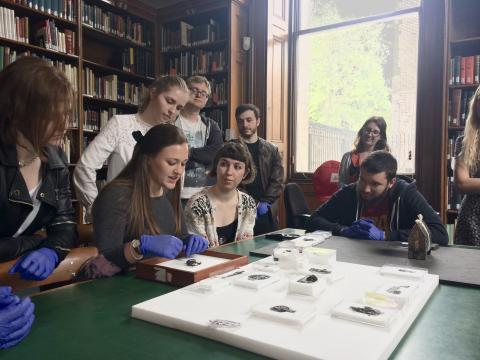The Digital Pilgrim Project is enhancing the accessibility of medieval pilgrim souvenirs and secular badges through the creation of digital resources. Viewed collectively, these prolific miniature representations, mostly cast in lead alloy between the 13th and 16th centuries, offer an overview of the visual language of medieval Christendom: a varied tongue spoken by the gamut of medieval socio-economic groups, perpetuated, in part, by the display of badges on hats and bags. They ought to be an important part of our understanding of medieval visual culture but art historical study has been prohibited by previously insurmountable practical issues.
A sample of newly digitised badges from the British Museum's collection (copyright: Trustees of the British Museum)
While many thousands of medieval badges have been discovered in river banks and harbours since the nineteenth century, they resist accessibility, even to determined scholars: being small and now heavily tarnished, they are easily outshone or overlooked in the gallery space, they are fragile and their low-relief imagery and inscriptions can be difficult to read. What is more, the overwhelming majority of surviving badges are in museums’ closed storage. It is only with the advent of digitisation that catalogue information and colour images of collections have appeared online, allowing projects like Kunera create digital databases to aid researchers. To an unprecedented degree, the internet age is offering new tools for interactive close-looking and big-data analysis, as well as the potential to share introductory media that could transform the general accessibility of these image-bearing objects.
Digital Pilgrim is funded by two digital project grants from the Paul Mellon Centre for Studies in British Art. The first phase of the project saw the creation of a sample collection of 3D models for the Museum’s Sketchfab page. In the meantime, the British Museum’s collection of over 680 badges, is undergoing full digitisation.
The second phase is gathering data on all the badge-finds in the UK and those of British badges abroad. Having collected the data, GIS software will be used to plot find-spots in relation to their pilgrimage sites of origin. To create visually rich short films incorporating the maps and models, the team are also gathering footage of badges’ manufacture and the landscapes of British pilgrimage. When complete, these films will be made available online for members of the public and for the use of educational institutions.
The production of these resources is leading to new research questions and ideas, which the Digital Pilgrim convenors will be drawing together in an edited volume to conclude the project’s activity.
The Team
Convenor: Amy Jeffs (aj383@cam.ac.uk), PhD candidate in History of Art, University of Cambridge
Convenor: Dr Gabriel Byng (gb332@cam.ac.uk), Research Fellow at Clare Hall, University of Cambridge
Research Assistant: Amy Kellenberger, MA student, University College London
Curatorial Advisor: Lloyd de Beer, Ferguson Curator of Medieval Europe, British Museum
Photogrammetry Specialist: Rob Kaleta, PhD Candidate, University College London
Undergraduate object session led by Digital Pilgrim at the British Museum


